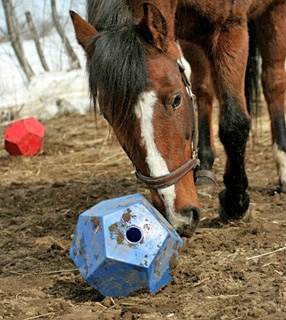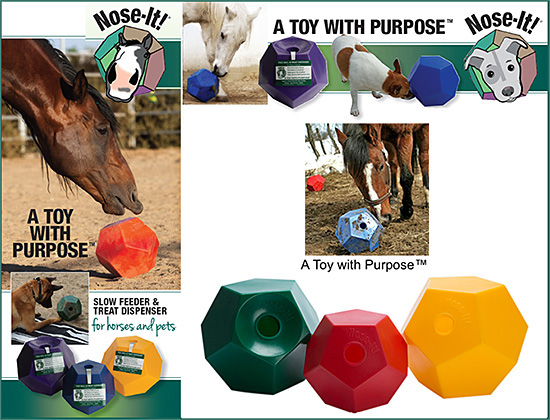 |
|
Slow feeding…. What it Means for the Health of Your Horse.
Though it’s not really anyone’s fault per se, today’s modern horse keeping practices have unfortunately forced
horses into sedentary lifestyles where free ranging and getting plenty of exercise foraging for foodstuffs has essentially become a thing of the past. Article by Dr. Amy M Gill for RS Bioceuticals
To compound the problem of too little exercise, many horses are often fed excessive amounts of concentrated rations and high
calorie, nutrient dense forages. Horses have evolved by nature to store energy (fat) and nutrients in times when feedstuffs are in
abundance in order to survive when food is sparse. This may well be protective under conditions of feast-and-famine where
efficient fat deposition is advantageous. While this survival mechanism may have been effective keeping horses alive during the ice
age, it is wreaking havoc with the physiological well-being of the twenty first century horse!
The modern, domesticated horse does not face winter without food anymore and  some horses, when presented with an abundance
of feeds on a regular basis, quickly develop an obese stature, especially when coupled with limited physical activity. Many of these horses have then become
resistant to the effects of Insulin, the hormone released from the pancreas in response to an increase in blood glucose following the ingestion of a starch meal.
Insulin resistance and aberrant carbohydrate metabolism play a role in disorders such as Cushing’s disease, Insulin Resistance, Laminitis, Recurrent Exertional
Rhabdomyolysis, and Polysaccharide Storage Myopathy. These disorders may be directly linked to the inability of certain individuals to metabolize large amounts
of starch over long periods of time. Over time, they all have deleterious effects on the health of the horse and in most cases require intense medical and nutritional intervention to avoid premature death. some horses, when presented with an abundance
of feeds on a regular basis, quickly develop an obese stature, especially when coupled with limited physical activity. Many of these horses have then become
resistant to the effects of Insulin, the hormone released from the pancreas in response to an increase in blood glucose following the ingestion of a starch meal.
Insulin resistance and aberrant carbohydrate metabolism play a role in disorders such as Cushing’s disease, Insulin Resistance, Laminitis, Recurrent Exertional
Rhabdomyolysis, and Polysaccharide Storage Myopathy. These disorders may be directly linked to the inability of certain individuals to metabolize large amounts
of starch over long periods of time. Over time, they all have deleterious effects on the health of the horse and in most cases require intense medical and nutritional intervention to avoid premature death.
Nutritionists are now recommending that most horses be fed a diet low in soluble carbohydrates, high in fiber and lower in calories. To achieve this, many horses
are now offered grain-free rations and lower quality forages that can be consumed in higher amounts and more continuously for both the mental and
physical health of the horse. These contemporary diets have helped immensely
with cutting down on calories, starches and sugars, but another problem still persists. Because these feeds are so concentrated
and are fed in large meals, usually only once or twice daily, many horses are eating too much food, too fast, and all at once. By
gobbling up the entire ration in a short period of time, they spend the rest of the day with nothing to eat, or do…which can lead to
stables vices and many physical problems that stem from an unhealthy hind gut.
 |
Slow feeders are popping up in the market place and are certainly one way of forcing a horse to eat slower and more deliberately.
Many variations of hay feeding systems have become available, from tanks or tubs with grates and small holes that the hay sits
under, to large durable bags that can hold a few flakes or entire bales. Many people have devised their own systems that work
well in their individual situation. However, it is achieved, slow feeding forage helps regulate feed intake and prevent horses from spending long periods of time with nothing to eat or do.
But what about slow feeding of the concentrate portion of the ration? Years ago, a couple of mechanized grain feeders came on
the market. They were programmable to feed small amounts multiple times per day. The concept was brilliant but unfortunately,
may have been before its time. The price of the technology probably did not help create lift off in the equine world either.
Nowadays however, the concept of slow feeding grain is starting to take a hold in barns across the globe.
One particular slow grain or treat feeder, the Nose-It! helps not only deliver feed in small amounts but also provides much needed
mental stimulation for the stalled or paddocked horse. The unit is not round, it has a unique and distinct patented twelve (12) sided
"SLOW-ROLL ONE EDGE AT A TIME™" design so the problem of it rolling out of bounds is minimized. The ability of the
horse to push the Nose-It™! and receive a small grain or treat reward is not only mentally stimulating but also simulates natural
browsing and foraging patterns. This feeding pattern will help keep a constant flow of digesta in the digestive tract which is a major factor in maintaining stabilization of the hind gut.
So which horses should be fed with “slow” feeding methods? All of them, but especially horses that are:
•Metabolically challenged with: Insulin Resistance, Cushing’s Disease, Tying-up, muscle disorders and intolerance to exercise
•Prone to eating too fast and risk choking on feedstuffs
•Stabled or paddocked for long periods of time
•Shipping long distances
•Recovering from illness or surgery
•Require a lot of feed to maintain body condition, such as show horses, race horses, competitive driving and trail horses
•Horses that exhibit behavioral vices
•Young, growing horses and broodmares that must consume a lot of feed for high rates of growth
Does your horse need a slow feeding system?
Contact: RS Bioceuticals
712 Brattleboro Rd.
Bernardston, Massachussetts 01338
Phone: 877-288-1760
Email: customerservice@rsbioceuticals.com
Website: rsbioceuticals.com
“Dr. Amy M Gill is an independent equine nutritionist based in Lexington KY and Boynton Beach FL. Dr. Gill specializes in
nutritional consultation and therapies for horses with metabolic, growth, exercise and immune related disorders.
She can be reached at drgill@equiforce.com or www.equiforce.com
|
 |
 |
|
To advertise your horse product or service, Contact Ann
|
|
|
InfoHorse.com, Horse Information Lives Here ® 2/23/2026
Contact Us to Advertise to over a million Horse Owners.
All images and content Copyright© 2014 by InfoHorse.com, Equusite.com.
Horse Owners are Dog Owners; Dog Product Information dognowner.com
|
|
|
|
Articles, Academic Schools, Arena Maintenance, Animal Communicators, Barns, Barn and Accessories, Barn Equipment and Tractors, Breast Collars, Grooming Products for Horses, Hay Feeders, Horse Blankets, Horse Books, Horse Videos, Horse Breeders, Horse Camping Gear, Career Schools, Carts and Buggies, Horse Training Clinicians, Equestrian Clothing, Dogs and Puppies, Horse Fencing, Western Art & Furniture, Horse Property for Sale, Horse Products For Sale, Fly Control, Foal Care, Horse Footings, Horse Gifts, Horse Health and Nutrition, Hoof and Leg, Horse Insurance, John Lyons Certified Trainers, Equine Lawyers, Leather Care, Links, Horse Property, Horse Photography, Portable Horse Stalls, Arenas and Roundpens, Horse Riding Schools, Horse Schools, Safety Products, Services for Horses, Horse Trailers, Horse Shipping, Horse Skin Coat Care, Horse Software, Specialty Trainers, Horse Summer Camps, Tack, Horse Trainers, Treats and Snacks, Truck Accessories, Trucks, Horse Vacations, Western Lifestyle, jewelry Equestrian-International.com G+
|
|
|